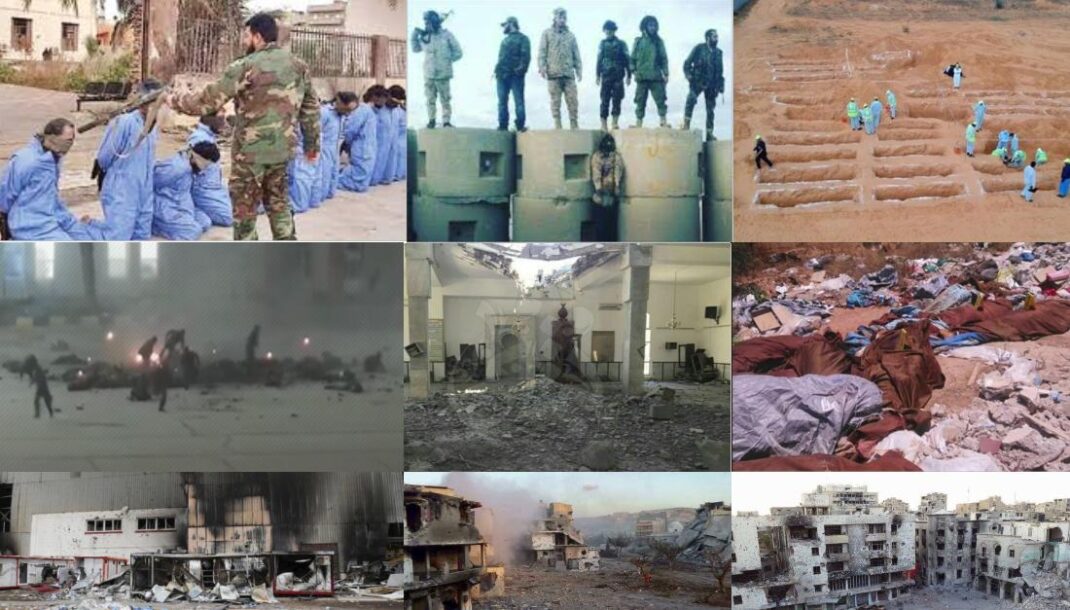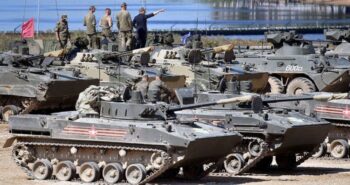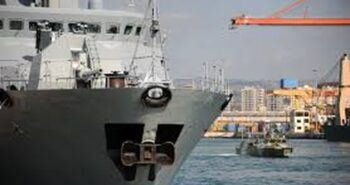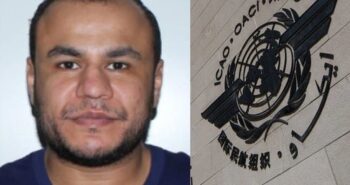The Criminal Role of Saudi Arabia and UAE
Mahmoud Refaat
 War crimes and crimes against humanity have been perpetrated by the belligerents in Libya and continue to make victims. It is necessary to conduct thorough investigations into the actions of Haftar and his seconds, who participated in massacres of civilians, such as in Tarhunah. These individuals must be prosecuted and convicted.
War crimes and crimes against humanity have been perpetrated by the belligerents in Libya and continue to make victims. It is necessary to conduct thorough investigations into the actions of Haftar and his seconds, who participated in massacres of civilians, such as in Tarhunah. These individuals must be prosecuted and convicted.
PART (VII)
4. The complicity of International Community
4.1 The supports to Haftar’s camp
Since the abdication of the Islamist-moved government in Tripoli in 2016 and the steady expulsion of its worldwide allies from the city, the largest mobilization of external interference in Libya has come from Haftar’s sponsors (a pattern that turned out to be much clearer after the end of the 2017 fight for Benghazi). He has since a long time ago depended on the help, if not followed the lead, of the UAE and Egypt.
Haftar dispatched his attack on Tripoli not long after getting back from an outing to Riyadh, where he probably get endorsement to progress with help from nations of the Middle East and North Africa.
The center of this help includes States that issues of the Arab uprisings, especially fair and favourable to Islamist powers and support dictators who can find a way into another territorial request.
Libya’s job as a performance center for provincial competitions, just as its monetary potential, has elevated the significance that these allies append to its destiny.
4.2 Egypt’s changing computations
Egypt’s help for Haftar comes from a combination of financial advantages, direct dangers to its security, and from Haftar’s and President Abdel Fattah el-Sisi’s common philosophy of militarism as the solitary cure to an existential Islamist danger.
In 2014 Egypt recognized generally its 1,100km-long desert line with Libya as a weakness that straightforwardly added to the developing number of fear-based oppressor assaults on its region and the insurrection on the Sinai Peninsula.
Haftar has been a characteristic partner for Cairo because of the area of his powers close to the Egyptian boundary. Furthermore, Cairo trusts that a steady Libya will set up the weak Egyptian economy, keep up the stock of the financed oil it has depended on since the principal bay conflict, and permit Egyptian workers in the nation –who, before the Arab uprisings, represented generally $33m each year in settlements– to continue work.
These contemplations drove Egypt to bet intensely on Haftar, furnishing him with meaningful military and conciliatory help after he dispatched Operation Dignity, in 2014. Having started as a military mission to dislodge Islamists and to limit more jihadists’ development from their ascendant situation in Benghazi, the activity morphed to address a more extensive, more political, mission.
All things considered, the connection among Egypt and Haftar immediately developed, with Egyptian powers completing airstrikes in Libya in any event for his sake soon thereafter. Notwithstanding, by 2019, Egypt felt that Haftar had minimized this relation for close contact with any semblance of France, Russia, and the UAE.
This, alongside worries that he was hazardously overextending himself, incited Egypt to investigate different roads to secure its inclinations – including by developing binds with the GNA’s executive, Fayez al-Sarraj, and its speaker of parliament, Aguila Saleh, while helping a resurgence of the ancient system.
Egypt additionally started to make its very own political interaction through its chairmanship of the African Union, endeavouring to adversary and, it trusted, replacing the UN’s public gathering measure. This proposition was likely intended to make a force dividing bargain among Sarraj and Saleh that might have bound together the state and contain Haftar inside a regular citizen general set of laws – at any rate until Libya held a political race or went through another political change.
In any case, Haftar’s attack on Tripoli constrained Egyptian pioneers to recalculate and, in the end, reaffirm their help for him. In the “with us or against us” division Haftar made, Egypt plans to secure its speculation, as the loss of his powers would be ruinous for its inclinations – and, even in a military impasse, Cairo could have freedoms to benefit and to reestablish some authority over him.
4.3 The UAE’s push for another local request
The UAE sees the Arab uprisings’ guarantee of a push towards agent government – and possibility that the (frequently Islamist-inclining) parties that stayed in resistance for quite a long time could one day come to control through the polling booth – as an existential danger. Emirati pioneers dread that the uprisings’ well known interest for rights and portrayal could arrive at their lines if effective somewhere else.
Since 2011, Abu Dhabi has situated itself at the bleeding edge of a territorial fight against the Arab uprisings and political Islamist gatherings – especially the Muslim Brotherhood, which it tried to move back by supporting Sisi’s takeover of Egypt. The UAE sees Libya as a focal landmark in this ideological and political battle.
Libya’s geographic position makes it critical to the UAE’s financial arrangement to overwhelm dispatching paths that stream into the Mediterranean. Libya’s immense energy assets and need for recreation – the two zones wherein the UAE practices – have set out rewarding open doors that the Emiratis expect to abuse, after they neglected to do as such previously.
This appealing combination of political and monetary interests has made Libya a vital piece of the local request Abu Dhabi tries to make. Like Egypt, the UAE sees Haftar’s political perspectives and military interpretations as reciprocal to its vision. Since 2014, the UAE has been vital to reinforcing his military capacities, just as his political help base (in Libya and abroad) and his global standing.
The UAE has purportedly disregarded the UN Security Council’s arms ban to give Haftar an assortment of military gear, including shielded work force transporters and even airplanes.
4.4 A defining moment in Saudi approach
Having since a long time ago considered itself to be the true head of the Sunni Arab world, Saudi Arabia at first took an altogether different way than other local forces to impacting Libya’s progress.
Maybe than taking part in obvious political mediation, Saudi strategy worked through a Salafist bunch that follows the lessons of Medina-based Islamic researcher Rabea al-Madkhali – a gathering that is on the edges of the Sahwa development yet near the state.
Following quite a while of laden relations with previous Libyan pioneer Muammar Qaddafi, Saudi pioneers saw Libya’s upset as a chance to change the country into a partner. Maybe perceiving that one arm of its conventional impact creating system, monetary sponsorship, would be inadequate in oil-rich Libya, Riyadh appears to have zeroed in on the other arm, strict power.
In this manner, it apparently intended to fabricate impact and change the socio-political personality of the Libyan State into one more amiable to collusion.
Since 2011, the Madkhalist bunch has developed rapidly to play a predominant part in Haftar’s security administrations (in spite of his affirmed secularism, just as Egyptian and Emirati scorn for Islamists) and Libya’s strict organizations.
The gathering’s confidence in complete acquiescence to the public chief (an idea known as wali al amr) and its ill will towards the Muslim Brotherhood made it an engaging early partner for Haftar.
With a similarity to cross country union, the gathering works semi-self-rulingly: it reacts to the Libyan world of politics and lessons from Saudi Arabia, yet in addition acts in accordance with its own strict thinking and shrewd interests.
The messages that Saudi-based researchers have coordinated at the Madkhalists seem to have moved over the course of the years as per Saudi approach, recommending a political connection.
Notwithstanding, the gathering’s autonomous objectives make it less flexible than Riyadh may want. For instance, while numerous Madkhalists in eastern Libya have joined Haftar’s powers, those in the west stay reluctant to take part in the contention – having since a long time ago guaranteed that their strict commitments request unwaveringness to Sarraj as their chief and, apparently, saw the contention as rebellious.
4.5 Russia’s quest for impact
As mentioned before on the outset, Russia has been able to remain at a distance in the Libyan conflict. Nevertheless, this strategy has not hindered Russia’s ability to increase their influence over Libya. Unlike the Arab nations like the UAE, which entered the conflict from the very beginning, Russia has chosen a very different approach, as they have remained very cautious of any actions that they should take.
As they have done before in order parts of the world, Russia has
backed a strong-man like Haftar during this conflict as they have provided him and the LNA with not only military but also diplomatic and financial support.
Nevertheless, Russia has been able to do so, while remaining in a much more independent position than other nations, as for instance they have been able to use the mercenaries of the Wagner Group to militarily support Haftar while remaining in a much more separate stance than other international players, which have directly supported him militarily like the UAE.
Not only that, but it has been widely reported that the Wagner Group has 1,200 mercenaries stationed in Libya, which have been absolutely crucial for Haftar being able to retain its position as the dominant power in the eastern half of Libya. As it has just been mentioned, Russia has not only offered military support to Haftar and the LNA, as Russia has also been absolutely crucial in their economic backing.
It has also been reported that since 2016 Russia has printed over 14 billion dinars’ worth of banknotes (more than $10 billion) without the approval of Libya’s central bank, through their state-owned company Goznak in order to support the LNA, as this economic help has enabled Haftar to triple the salary of the LNA ́s personnel, which has been extremely effective in ensuring his position of power.
In addition, Russia has been able to use their extensive control over social media to launch several campaigns in different platforms like Facebook, Twitter or YouTube in order to portray themselves and their allies in a much better light, as well as they have been able to use these platforms in order to promote their views, while also being able to heavily criticise other parties, which are also involved in this conflict, like for instance the US.
Not only that but Russia has also been able to use more traditional forms of media in order to carry out this strategy as for instance, Russia has been supporting two local broadcast television networks and one print newspaper in Libya, and also has been publishing content in Arabic in the Russian media, like Sputnik and Russia Today.
Nevertheless, even though Russia has been continuously backing Haftar and the LNA, they have never broken their relationship with the GNA. Instead, they have tried to promote peace talks between the two parties as this would not only portray Russia as a crucial actor for achieving peace in such a unstable country, while also this would ensure Russia the ability to obtain the benefits that they are seeking in Libya.
Russia sees Libya as a crucial piece in its international strategy for various reasons. Firstly, its location on the Mediterranean Sea and its 1,100 miles of coastline offer Russia the unique opportunity of strengthening logistically and geo-strategically its navy.
Not only that but, obtaining a position of dominance over Libya would enable Russia to become an ever stronger player in the European sphere, which President Putin sees as key especially after the Ukrainian and Syrian conflicts, as well as, to obtain an incredible amount of leverage over the EU, particularly due to the fact that they would have the ability of influencing the refugee flows towards the Union, which he created incredible resentment and disunion between the Member States of the EU.
Therefore, Russia sees the Libyan conflict as a great opportunity for furthering a multipolar international system in which they are one of the most influential powers with others like the US or China.
Finally, Libya also offers Russia incredible economic benefits, as for instance, in 2017 the Russian oil company Rosneft was able to sign a deal with Libya’s National Oil Corporation. What is more, it has been widely reported that Nasser Shaglan has maintained talks with diverse Russian officials about bringing back the Benghazi–Sirte railway project, which was stopped after the end of Gaddafi’s regime.
***
Mahmoud Refaat is an expert in international law, politician and writer. Refaat is the president of the European Institute for International Law and International Relations in Brussels, Belgium.
______________





